Water Supply Backflow Preventers
The backflow preventers shown below are the most common types used to protect water distribution systems from cross connections caused by backflow, backpressure or backsiphonage.
Swing check valve
These simple backflow preventers have a single disc type check that swings open under flow and closes under no flow or backflow conditions. They are typically used for commercial / industrial applications but may also be found in residential heating systems. |
 |
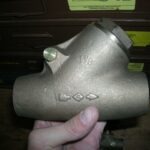 |
|
Inline check valve
Typically used in well systems, these single check valves have a spring actuated disc that will only open under flow conditions. |
 |
 |
|
Dual check valve
These backflow preventers are typically used in low health risk applications, such as to protect the municipal system from a residential potable system. They are non testable, have two spring loaded check valves and are typically installed immediately downstream of the water meter. |
 |
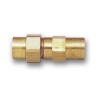 |
|
Double check valve assembly (DCA)
These backflow preventers do not provide any additional protection over a dual check valve, except that they are testable and have isolation valves that permit easy servicing. DCA’s are typically used to prevent cross connections in scenario’s that don’t pose a significant health risk. |
 |
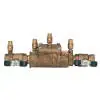 |
|
Double check valve with atmospheric port (DCAP)
These backflow preventers are used in low health risk systems, such as a boiler feed. They have two spring loaded check valves with an intermediate opening that will allow water to discharge if the second check valve fails to properly seat under backflow conditions. |
 |
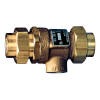 |
|
Reduced pressure zone assembly (RPZ)
The ultimate in backflow prevention, these devices provide three layers of protection that can be used in high health risk hazards. RPZ’s have two check valves and an intermediate chamber that diverts water out of the system if back-pressure or back-siphonage occurs. It is a testable device and has upstream and downstream stops for servicing reasons. |
 |
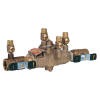 |
|
Anti-Siphon vacuum breaker
As the name suggests, these devices will prevent siphonic action from introducing possible contamination into the potable water system, by allowing air into the pipe and breaking the siphon. |
 |
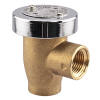 |
|
Spill resistant anti-siphon vacuum breaker
Same as the original Anti-siphon Vacuum breaker, but is testable and also includes a spill resistant cap that is better suited for some indoor applications. |
 |
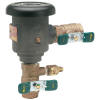 |
|
Hose bibb vacuum breaker
The garden hose that you have at your home poses the single greatest backflow risk to your potable water system, as they are often left immersed in contaminated water; filling up pools, ponds and other chemical concoctions. They prevent backsiphonage by allowing air into the system. |
 |
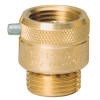 |
|
Thanks to Watts Canada for the use of the photographs.









